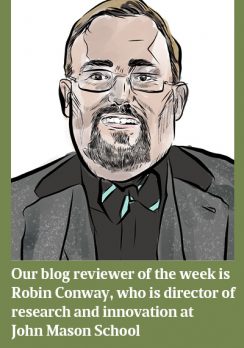Centering reading, using research, making history, valuing professional development and leading through a pandemic are Robin Conway’s top picks of this week’s education topics
EEF Blog: How to use reading as a starting point for learning this year
@bilton_caroline
Another great blog from the EEF team, this time from Caroline Bilton, explaining how Cragside Church of England Primary School is “putting reading at the heart of their approach to teaching and learning this year”. As a secondary teacher, I often used to skip over primary education blogs, assuming they were not relevant to me. How wrong I was. Whatever your teaching phase, there are some excellent ideas in this piece, clearly explained: modelling inferencing through high-quality discussion and the motivational effect this has on children cannot be phase-specific. The link between talk and reading and strategies for building a love of reading are clearly explained and the use of reading to reconnect with children after lockdown is a great approach.
@BradResearchSch
Mark Miller of Bradford Research School has written a very useful piece here. It is easy for us teachers to overlook the importance of engaging with research critically and bringing our own expertise and knowledge of context into play. Simplistic strategies imported without thought are unlikely to improve the quality of learning, whether they come from a highly paid external Inset provider or the EEF. Miller explains some of the principles behind evaluating research, looking at the detail beneath metanalyses and going “beyond the headlines” to find the nuances. The aim is not to disparage educational research but to empower teachers to make the most of it and, as such, it is a very helpful contribution.
@First_Floor_8
When recommending reading to colleagues it is easy to overlook subject-specific blogs for fear of appearing parochial or because their relevance tends to be equally specific. Even those that have wider appeal require more effort to appreciate from non-specialists. As a history teacher, therefore, I am particularly averse to recommending history blogs, but this one is worth an exception. Although the examples and curriculum issues on which Harriet Cornwell reflects may not be familiar to non-historians, the post offers an engaging and thought-provoking analysis of the process of curriculum development, adaptation and improvement. Early mistakes have been learned from and a clear intent has been developed in this history department. Some of the issues faced, such as diversity, are considerations in many subjects. And even where the specifics do not apply beyond history, the journey and reflections on building a better curriculum, “the stepping back, the patient and careful perusal” are well worth sharing.
What Makes a Great Teacher? The Value of Professional Development
@Cam_Assessment
The Great Teaching Toolkit: Evidence Review released in June 2020 is a product of extensive research conducted by Professor Rob Coe and the team at Evidence Based Education. In my opinion it should be widely read within the profession. This blog takes the form of an interview with Professor Coe in which he shares some of his learning from the process, and it makes an engaging read. It sheds light both on the scale of the research conducted and also on some of the key conclusions, especially how important teachers’ professional development can be. “When it’s done well,” says Coe, “it really does have a huge effect on educational improvement.” If you’ve already read the toolkit, this may not add much, but if not, this makes a great introduction to that work, as well as linking to a great webinar on the toolkit itself.
@MrMChatley
It is hard to think of a time when school leadership has ever been more important or more challenging. It is a very fair point that “never before have any of us had to deal with the complexities and ever-changing nature of a global pandemic”. This piece offers eight key pieces of advice to leaders, learnt from the experience of the pandemic. But the lessons drawn, ranging from the importance of honest acknowledgement of mistakes to “keep the main thing the main thing”, are of value to leaders at all levels and should resonate long after the current crisis is over.













Your thoughts